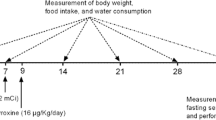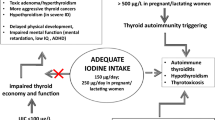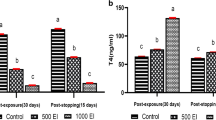Abstract
The BB/Wor rat spontaneously develops autoimmune insulin dependent diabetes mellitus and lymphocytic thyroiditis (LT). Excess iodine ingestion enhances and low iodine diet decreases the incidence of LT in this rat model but does not affect the incidence of diabetes mellitus. The administration of a low dose of methimazole (MMI; 870 ng/gm bw ip daily) from 30–90 days of age had no significant effect on thyroid function or on the incidence of iodine induced LT and serum anti-thyroglobulin (Tg) antibodies measured by an ELISA assay. A large dose of MMI (0.05% in the drinking water) induced goiter and hypothyroidism. In addition, the incidence of LT was markedly attenuated (76% vs 6%, p < 0.001) and reduced titers of serum anti-Tg antibodies (0.59 ± 0.1 OD vs 0.08 ± 0.01, p < 0.001) were observed. This inhibitory effect of MMI on the occurrence of iodine induced LT in the BB/Wor rat may be due to the lower antigenicity of the poorly iodinated Tg secondary to MMI therapy and/or to an immunosuppressant effect of MMI itself.
Similar content being viewed by others
References
Pinchera A., Liberti P., Martino E., Fenzi G.F., Grasso L., Rovis L., Baschieri L., Doria G. Effects of anti-thyroid drug therapy on the long acting thyroid stimulator and the antithyroglobulin antibodies. J. Clin. Endocrinol. Metab. 29: 231, 1969.
Teng C.S., Yeung R.T.T. Changes in thyroid-stimulating antibody activity in Graves’ disease treated with anti-thyroid drug and its relationship to relapse: A prospective study. J. Clin. Endocrinol. Metab. 50: 144, 1980.
Fenzi G.F., Hashizume K., Roudeboush C.P., DeGroot L.J. Changes in thyroid stimulating immunoglobulins during antithyroid drug therapy. J. Clin. Endocrinol. Metab. 48: 572, 1980.
McGregor A.M., Petersen M.M., McLachlan S.M., Rooke P., Smith B.R., Hall R. Carbimazole and the autoimmune response in Graves’ disease. N. Engl.J. Med. 303: 302, 1980.
Karlsson F.A., Dahlberg P.A. Thyroid stimulating antibodies (TSAb) in patients with Graves’ disease undergoing antithyroid drug treatment. Indicators of activity of disease. Clin. Endocrinol. (Oxf.) 14: 579, 1981.
McGregor A.M., Ibbertson H.K., Smith B.R., Hall R. Carbimazole and autoantibody synthesis in Hashimoto’s thyroiditis. Br. Med. J. 288: 518, 1984.
Wilson R., McKillop J.H., Chopra M., Thompson J.A. The effect of antithyroid drugs on B and T cell activity in vitro. Clin. Endocrinol. (Oxf.) 28: 389, 1988.
Weetman A.P., McGregor A.M., Hall R. Evidence for an effect of antithyroid drugs on the natural history of Graves’ disease. Clin. Endocrinol. (Oxf.) 21: 163, 1984.
Codaccioni J.L., Orgiazzi J., Blanc P., Pugeat M., Roulier R., Carayon P. Lasting remissions in patients treated for Graves’ hyperthyroidism with propranolol alone: A pattern of spontaneous evolution of the disease. J. Clin. Endocrinol. Metab. 67: 656, 1988.
Totterman T.M., Karlsson F.A., Bengtsson M., Mendel-Hartvig I. Induction of circulating activated suppressor-like T cells by methimazole therapy for Graves’ disease. N. Engl. J. Med. 316: 15, 1987.
Ludgate M.E., McGregor A.M., Weetman A.P., Ratonachaiyavong S., Lazarus J.H., Hall R., Middleton G.W. Analysis of T cell subsets in Graves’ disease: alterations associated with carbimazole. Br. Med. J. 288: 526, 1984.
Volpe R., Karlsson A., Jansson R., Dahlberg P.A. Evidence that antithyroid drugs induce remissions in Graves’ disease by modulating thyroid cellular activity. Clin. Endocrinol. (Oxf.) 25: 453, 1986.
McGregor A.M., Rees-Smith B., Hall R., Petersen M.M., Miller M., Dewitz P.J. Prediction of relapse in hyperthyroid Graves’ disease. Lancet 1: 1101, 1980.
Volpe R. Autoimmune thyroid disease. In: Volpe R. (Ed.), Autoimmunity and endocrine disease. Marcel Dekker, New York, 1985, p. 109.
Davies T.F., Weiss I., Gruber M.A. Influence of methimazole on murine thyroiditis. J. Clin. Invest. 73: 367, 1984.
Rennie D.P., McGregor A.M., Keast D., Weetman A.P., Foord S.M., Dieguez C., Williams E.D., Hall R. The influence of methimazole on thyroglobin-induced autoimmune thyroiditis in the rat. Endocrinology 112: 326, 1983.
Allen E.M., Rajatanavin R., Nogimori T., Cushing G., Ingbar S.H., Braverman L. The effect of methimazole on the development of spontaneous lymphocytic thyroiditis in the diabetesprone BB/Wor rat. Am. J. Med. Sci. 292: 167, 1986.
Romaldini J.H., Bromberg N., Werner M.C. Comparison of effects of high and low dose regimens of antithyroid drugs in the management of Graves’ hyperthyroidism. J. Clin. Endocrinol. Metab. 57: 563, 1983.
Allen E.M., Appel M.C., Braverman L.E. The effect of iodide ingestion on the development of spontaneous lymphocytic thyroiditis in the diabetesprone BB/W rat. Endocrinology 118: 1972, 1986.
Solomon B.L., Euaul J.E., Burman K.D., Wartofsky L. Remission rates with antithyroid drug therapy: Continuing influence of iodine intake. Ann. Intern. Med. 107: 510, 1987.
Azizi F. Environmental iodine intake affects the response to methimazole in patients with diffuse toxic goiter. J. Clin. Endocrinol. Metab. 61: 374, 1987.
Czarnocka B., Ruf J., Ferrand M., Carayon P., Lis-sitzky S. Purification of the human thyroid peroxidase and its identification as the microsomal antigen involved in autoimmune thyroid diseases. FEBS. Lett. 190: 147, 1985.
Engler H., Taurog A., Luthy C., Dorris M.L. Reversible and irreversible inhibition of thyroid peroxidase-catalyzed iodination by thioureylene drugs. Endocrinology 112: 190, 1983.
Shiroozu A., Taurog H., Engler H., Dorris M.L. Mechanism of action of thyroureylene antithyroid drugs in the rat: Possible inactivation of thyroid peroxidase by propylthiouracil. Endocrinology 113: 362, 1983.
Sundick R.S., Herdegen D.M., Brown T.R., Bagchi N. The incorporation of dietary iodine into thyroglobulin increases its immunogenicity. Endocrinology 120: 2078, 1987.
Champion B.R., Rayner D.C., Byfield P.G.H., Page K.R., Yo Chan C.T., Roitt I.M. Critical role of iodination for T cell recognition of thyroglobulin in experimental murine autoimmunity. J.Immunol. 139: 3665, 1987.
Nunez J., Pommier J. Formation of thyroid hormones. Vitam. Horm. 39: 175, 1982.
Weetman A.P., Gunn C., Hall R., McGregor A.M. The accumulation of [35S] methimazole by monocytes and macrophages. Acta Endocrinol. (Kbh.) 107: 366, 1984.
Weetman A.P., Holt E., Campbell A.K., Hall R., McGregor A.M. Methimazole and generation of oxygen radicals by monocytes: Potential role in immunosuppression. Br. Med. J. 208: 518, 1984.
Taylor J.J., Wilson R.L., Kendall-Taylor P. Evidence for direct interactions between methimazole and free radicals. FEBS. Lett. 176: 337, 1984.
Reinhardt W., Paul T.L., Allen E.M., Alex S., Yang Y.N., Appel M.C., Braverman L.E. Effect of L-thyroxine administration on the incidence of iodine induced and spontaneous lymphocytic thyroiditis in the BB/Wor rat. Endocrinology 122: 1179, 1988.
Woda B.A., Like A.A., Padden C., McFadden M. Deficiency of phenotypic cytotoxic-suppressor T lymphocytes in the BB/W rat. J. Immunol. 136: 856, 1986.
Author information
Authors and Affiliations
Additional information
Supported by Grants DK 18919, DK 30657 and DK 41090, NIDDK, NIH, Bethesda, MD and Deutsche Forschungsgemeinschaft.
Rights and permissions
About this article
Cite this article
Reinhardt, W., Appel, M.C., Alex, S. et al. The inhibitory effect of large doses of methimazole on iodine induced lymphocytic thyroiditis and serum anti-thyroglobulin antibody titers in BB/Wor rats. J Endocrinol Invest 12, 559–563 (1989). https://doi.org/10.1007/BF03350760
Received:
Accepted:
Published:
Issue Date:
DOI: https://doi.org/10.1007/BF03350760




